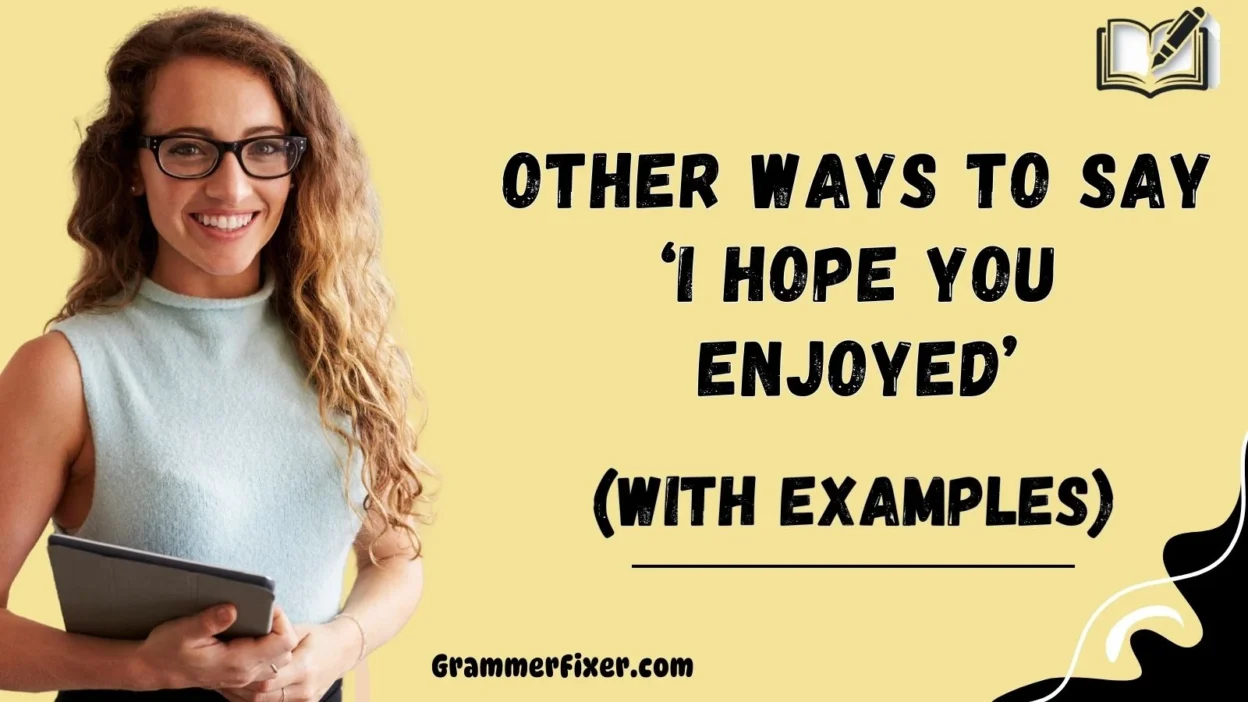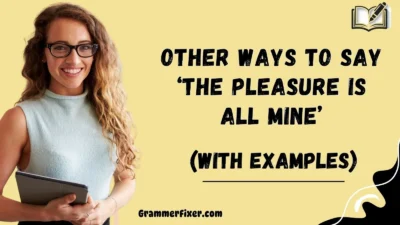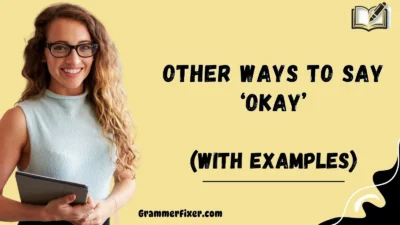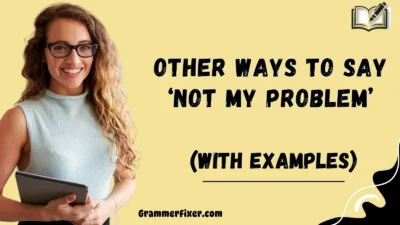Finding the right words to express care and warmth can turn an ordinary message into one that feels personal, genuine, and memorable. Whether you’re writing an email after a professional event, sending a thank-you message to a client, or simply reaching out to a friend, the phrase “I hope you enjoyed” can convey gratitude, thoughtfulness, and connection.
However, there are many other ways to say it that can better fit the tone, setting, and relationship you have with the person. In this article, we’ll explore 30 thoughtful alternatives — each explained with meaning, examples, best use cases, and tone — so you can express yourself in the most effective way possible.
What Does “I Hope You Enjoyed” Mean?
The phrase “I hope you enjoyed” is a polite, empathetic way of expressing that you wish the recipient had a positive, satisfying, or fulfilling experience with something — be it an event, meeting, product, trip, or conversation. It’s about acknowledging their participation or presence while showing interest in their feelings.
It works in professional, casual, and personal contexts, but the tone can shift depending on what follows the phrase and how you frame it.
When to Use “I Hope You Enjoyed”
You might use “I hope you enjoyed” in situations such as:
- After a meeting or presentation — “I hope you enjoyed the workshop and found it insightful.”
- Following an event or trip — “I hope you enjoyed your visit to New York.”
- Post-purchase or service feedback — “I hope you enjoyed the meal kit we delivered.”
- Personal greetings and messages — “I hope you enjoyed your weekend with friends.”
It’s a versatile phrase that works well when you want to connect warmly and show appreciation for someone’s time or participation.
Is It Professional/Polite to Say “I Hope You Enjoyed”?
Yes — “I hope you enjoyed” is generally professional, polite, and widely accepted in both formal business communications and friendly interactions.
The key is to pair it with specific details (e.g., “I hope you enjoyed the conference session on marketing strategies”) so it feels personalized rather than generic.
Pros or Cons
Pros:
- Versatile — works in personal and professional settings.
- Warm & empathetic — conveys care for the other person’s experience.
- Easy to personalize — can be tailored to specific events or situations.
Cons:
- Can sound generic if overused.
- May feel insincere if the rest of the message doesn’t match the tone.
- Lacks specificity unless details are added.
1. I Trust You Enjoyed
Meaning: Expresses confidence that the person’s experience was positive.
Detailed Explanation: This alternative adds a slightly more formal and assured tone than “I hope you enjoyed.” It’s often used in business correspondence or formal invitations where you want to show polished professionalism.
Scenario Example:
- “I trust you enjoyed the networking session and made valuable connections.”
Best Use: Formal follow-ups after corporate events, training sessions, or client meetings.
Worst Use: Casual chats with close friends — it may sound too formal or stiff.
Tone: Professional, respectful, confident.
2. I’m Glad You Enjoyed
Meaning: States happiness after confirming the person’s positive experience.
Detailed Explanation: This is best used after you already know they enjoyed something (perhaps because they said so). It feels warm and personal.
Scenario Example:
- “I’m glad you enjoyed the workshop — your active participation really enriched the discussion.”
Best Use: When responding to feedback or in a thank-you reply.
Worst Use: As an opening statement before you know their opinion — it assumes too much.
Tone: Friendly, warm, conversational.
3. I Hope It Was Worthwhile
Meaning: Suggests you value their time and hope it was well-spent.
Detailed Explanation: This works well in professional communications, especially when people invested time or effort to attend an event or participate in something.
Scenario Example:
- “I hope it was worthwhile attending our annual marketing summit.”
Best Use: Professional events, training programs, and client briefings.
Worst Use: Casual family gatherings — can feel too business-like.
Tone: Professional, considerate.
4. I Hope It Brought You Joy
Meaning: Expresses the wish that the experience gave them happiness and contentment.
Detailed Explanation: This is more emotional and heartfelt, making it suitable for personal notes, gifts, or celebratory messages.
Scenario Example:
- “I hope it brought you joy to see all your friends gathered for your surprise party.”
Best Use: Birthdays, weddings, anniversaries, and personal celebrations.
Worst Use: Corporate performance reviews — too emotional for the context.
Tone: Warm, personal, sentimental.
5. I Trust You Found It Valuable
Meaning: Shows belief that the recipient gained insights or benefits.
Detailed Explanation: This phrase works especially well for workshops, seminars, and professional discussions where knowledge-sharing is a priority.
Scenario Example:
- “I trust you found the training session valuable and applicable to your current projects.”
Best Use: Educational or professional learning events.
Worst Use: Light-hearted personal events — feels too formal.
Tone: Professional, appreciative, focused on utility.
6. I Hope It Met Your Expectations
Meaning: Conveys the wish that the experience matched or exceeded what they were hoping for.
Detailed Explanation: This is a polite and professional way to ensure the recipient feels satisfied while subtly inviting constructive feedback.
Scenario Example:
- “I hope it met your expectations and provided useful insights for your marketing strategy.”
Best Use: Client services, professional training, and product demonstrations.
Worst Use: Informal conversations with friends — can sound overly business-like.
Tone: Polite, professional, expectation-focused.
7. I Hope You Found It Gratifying
Meaning: Expresses hope that the experience was rewarding and fulfilling.
Detailed Explanation: This phrase has a slightly formal and thoughtful tone, suitable for situations where personal achievement or satisfaction is involved.
Scenario Example:
- “I hope you found it gratifying to see your hard work showcased at the conference.”
Best Use: Recognition messages, awards, or post-project communication.
Worst Use: After casual events — might feel overly heavy or formal.
Tone: Formal, appreciative, reflective.
8. I Hope It Was a Delightful Experience
Meaning: Suggests you wish the recipient’s experience was pleasant and enjoyable.
Detailed Explanation: This is warmer and more descriptive than “I hope you enjoyed,” making it feel more personal.
Scenario Example:
- “I hope it was a delightful experience visiting our countryside retreat.”
Best Use: Hospitality, tourism, event follow-ups.
Worst Use: Corporate project updates — might feel too casual or flowery.
Tone: Friendly, warm, customer-focused.
9. I Trust You Relished the Moment
Meaning: Implies confidence that the person fully enjoyed and savored the experience.
Detailed Explanation: This has a poetic, almost literary feel, and works well for personal messages or memorable events.
Scenario Example:
- “I trust you relished the moment when your team took home the championship trophy.”
Best Use: Celebrations, achievements, milestones.
Worst Use: Routine business interactions.
Tone: Expressive, celebratory, heartfelt.
10. I Hope It Added Value to Your Day
Meaning: Suggests the experience was worthwhile and made their day better.
Detailed Explanation: This balances professional courtesy with a touch of friendliness, making it versatile.
Scenario Example:
- “I hope it added value to your day to join our product feature demo.”
Best Use: Business meetings, client calls, and seminars.
Worst Use: Very casual chats — might sound too formal.
Tone: Professional, warm, constructive.
11. I Hope It Was Time Well Spent
Meaning: Conveys respect for the recipient’s time investment.
Detailed Explanation: This phrase emphasizes appreciation for their participation while subtly highlighting productivity.
Scenario Example:
- “I hope it was time well spent joining our leadership development workshop.”
Best Use: Professional settings, project meetings, consultations.
Worst Use: Leisure events — might come off as transactional.
Tone: Respectful, professional, considerate.
12. I Hope You Found It Rewarding
Meaning: Expresses hope that the recipient benefited or learned something valuable.
Detailed Explanation: This works especially well for training sessions, conferences, and collaborations.
Scenario Example:
- “I hope you found it rewarding to engage with industry leaders at the summit.”
Best Use: Educational and networking contexts.
Worst Use: Light-hearted casual scenarios.
Tone: Encouraging, appreciative, knowledge-focused.
13. I Trust It Was Enjoyable
Meaning: A confident yet polite way to express hope that they liked the experience.
Detailed Explanation: Similar to “I trust you enjoyed,” but slightly less formal, making it a versatile choice.
Scenario Example:
- “I trust it was enjoyable working together on this project.”
Best Use: Team collaborations, client wrap-ups.
Worst Use: Very formal events requiring high decorum.
Tone: Friendly-professional, confident.
14. I Hope It Was Fulfilling
Meaning: Suggests you wish the person felt content and satisfied from the experience.
Detailed Explanation: Works well when personal meaning or achievement is involved.
Scenario Example:
- “I hope it was fulfilling to mentor the new interns this season.”
Best Use: Volunteer work, mentoring, community activities.
Worst Use: Casual leisure events — could sound overly serious.
Tone: Warm, meaningful, reflective.
15. I Hope You Had a Great Time
Meaning: A simple, friendly expression of wishing they enjoyed themselves.
Detailed Explanation: Less formal and perfect for casual or semi-formal interactions.
Scenario Example:
- “I hope you had a great time at the company picnic.”
Best Use: Social events, friendly client interactions.
Worst Use: Highly formal business communications.
Tone: Light-hearted, approachable.
16. I Hope It Was a Memorable Experience
Meaning: Expresses hope that the occasion was special and lasting in their memory.
Detailed Explanation: Works well for unique, one-off events.
Scenario Example:
- “I hope it was a memorable experience attending our 10th anniversary gala.”
Best Use: Special celebrations, milestone events.
Worst Use: Ordinary day-to-day interactions.
Tone: Warm, commemorative, sentimental.
17. I Trust You Enjoyed Every Moment
Meaning: Implies belief that they fully appreciated the entire experience.
Detailed Explanation: More intimate and emotionally expressive than the standard phrase.
Scenario Example:
- “I trust you enjoyed every moment of your holiday in Italy.”
Best Use: Travel, vacations, personal events.
Worst Use: Technical or work-focused interactions.
Tone: Heartfelt, expressive.
18. I Hope It Was a Pleasure
Meaning: Suggests you wish they found the experience pleasant and satisfying.
Detailed Explanation: Short and adaptable for both formal and informal contexts.
Scenario Example:
- “I hope it was a pleasure working with our design team.”
Best Use: Client wrap-ups, professional services.
Worst Use: Playful chats with friends — may feel overly formal.
Tone: Polite, adaptable, courteous.
19. I Hope It Left You Smiling
Meaning: Conveys a wish that the event or experience brought happiness.
Detailed Explanation: A light and uplifting alternative perfect for casual, positive communication.
Scenario Example:
- “I hope it left you smiling after our surprise team lunch.”
Best Use: Celebrations, friendly follow-ups.
Worst Use: Formal reports or business updates.
Tone: Cheerful, friendly, uplifting.
20. I Hope It Was Insightful
Meaning: Suggests you wish the person gained new understanding or ideas.
Detailed Explanation: Excellent for educational and professional contexts.
Scenario Example:
- “I hope it was insightful to explore the latest marketing trends together.”
Best Use: Webinars, conferences, training.
Worst Use: Leisure or entertainment events.
Tone: Professional, learning-focused.
21. I Hope It Brought You Satisfaction
Meaning: Suggests you wish the recipient felt content and pleased.
Detailed Explanation: Works for both personal achievements and professional results.
Scenario Example:
- “I hope it brought you satisfaction to see the completed project.”
Best Use: Project completion, recognition notes.
Worst Use: Casual social events.
Tone: Appreciative, formal, respectful.
22. I Hope It Was Worth the Effort
Meaning: Acknowledges their contribution and time, wishing it was worthwhile.
Detailed Explanation: Great for contexts where the person invested significant effort.
Scenario Example:
- “I hope it was worth the effort participating in our charity drive.”
Best Use: Volunteer events, teamwork acknowledgments.
Worst Use: Short, lighthearted chats — can feel heavy.
Tone: Respectful, appreciative.
23. I Hope It Met Your Needs
Meaning: Conveys the wish that the experience or product fulfilled their requirements.
Detailed Explanation: Very useful in customer service and client-focused industries.
Scenario Example:
- “I hope it met your needs in streamlining your workflow.”
Best Use: Service follow-ups, customer care emails.
Worst Use: Social occasions.
Tone: Professional, service-oriented.
24. I Trust You Benefited from It
Meaning: Expresses belief that they gained value or improvement.
Detailed Explanation: Good for educational, strategic, or consulting contexts.
Scenario Example:
- “I trust you benefited from our one-on-one coaching session.”
Best Use: Learning, coaching, consulting.
Worst Use: Casual leisure conversations.
Tone: Professional, constructive.
25. I Hope You Took Away Something Valuable
Meaning: Suggests the hope they gained insights or meaningful experiences.
Detailed Explanation: A friendly-professional tone that works in learning environments.
Scenario Example:
- “I hope you took away something valuable from today’s marketing discussion.”
Best Use: Workshops, seminars, training.
Worst Use: Purely social events.
Tone: Encouraging, professional.
26. I Hope It Was an Enriching Experience
Meaning: Expresses that you wish the event added positively to their knowledge or life.
Detailed Explanation: Slightly formal and ideal for educational or cultural settings.
Scenario Example:
- “I hope it was an enriching experience attending the art exhibition.”
Best Use: Cultural events, learning programs.
Worst Use: Very casual scenarios.
Tone: Formal, cultured, intellectual.
27. I Hope You Found It Enjoyable and Useful
Meaning: Combines pleasure and practicality in one expression.
Detailed Explanation: Works well when both fun and value are intended outcomes.
Scenario Example:
- “I hope you found it enjoyable and useful to join our creative brainstorming session.”
Best Use: Creative workshops, interactive events.
Worst Use: Highly formal occasions.
Tone: Friendly-professional, balanced.
28. I Hope It Was Everything You Expected
Meaning: Suggests you wish their expectations were fully met.
Detailed Explanation: Adds a reassuring, customer-focused tone.
Scenario Example:
- “I hope it was everything you expected from our product launch event.”
Best Use: Hospitality, service delivery, product launches.
Worst Use: Highly informal scenarios.
Tone: Polite, customer-centric.
29. I Hope It Was Worth Your While
Meaning: Expresses that their time and effort were well invested.
Detailed Explanation: Slightly more conversational than “worthwhile,” making it approachable.
Scenario Example:
- “I hope it was worth your while attending the networking dinner.”
Best Use: Business and networking contexts.
Worst Use: Emotional or celebratory personal events.
Tone: Professional-casual, respectful.
30. I Hope It Made a Positive Difference
Meaning: Suggests you wish the event or action had a beneficial impact.
Detailed Explanation: Powerful for motivational, educational, and service-related communications.
Scenario Example:
- “I hope it made a positive difference in how you approach your marketing campaigns.”
Best Use: Coaching, mentoring, community initiatives.
Worst Use: Trivial social events.
Tone: Encouraging, impactful, professional.
Conclusion
Using alternatives to “I hope you enjoyed” can help your communication feel more genuine, tailored, and context-appropriate. The right phrase depends on your relationship with the recipient, the setting, and the emotions you want to convey. In professional contexts, choose polite, value-focused phrases like “I trust you found it valuable.” In personal situations, warm options like “I hope it brought you joy” can feel more heartfelt.
By adapting your language thoughtfully, you ensure your message is memorable, sincere, and well-received, fostering stronger connections in both professional and personal relationships.



